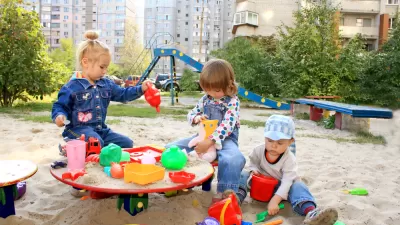Low crime rates and affordable property preoccupy adults, but kids need something more: the ability to walk the streets and play out on their own. In The Guardian, Viv Groskop explores the "popsicle test" and other elements of child-friendly cities.

Writing in The Guardian, Viv Groskop explores the "popsicle test" and other elements of child-friendly cities, drawing on the observations of Tim Gill, Eric Feldman, and Aaron Renn:
Increasingly, town-planning types base their rating of a city as “child-friendly” on something called “the popsicle test”. The popsicle test will be familiar to anyone who grew up in the 1970s, whose neighbourhood probably unknowingly passed it with flying colours. The test is this: a child can safely walk to a store, buy a popsicle and return home before it melts. (The real test, of course, is whether you can find a popsicle for under £1. Or a proper popsicle generally.) Tim Gill is one of the UK’s leading thinkers on childhood and author of No Fear: Growing Up in a Risk-Averse Society. He is a fan: “It’s a good test, precisely because it focuses on a central idea in child-friendliness: children’s everyday freedoms and choices. And it links this directly to local geography and perceived safety.”
And more on the popsicle test, among a lot more in the article about how to evaluate cities for their family-friendliness:
Eric Feldman lives in Washington DC and is an urban designer with award-winning architectural firm Rhodeside & Harwell. He writes a blog for Plan.Place about how his professional thinking is being changed by navigating the city with “a 34-inch sub-consultant” in the shape of his two-year-old daughter. He is also on board with the popsicle test. “The main value is how it illustrates, quite simply and clearly, an underlying truth in city planning: if a neighbourhood works for the youngest (and oldest) members of the community, then chances are it will work well for everyone. Will corner stores and popsicles alone enable us to crack the code of child-friendly cities? No. However, the presence of corner stores does signify a certain measure of walkability and reduced reliance on cars. And I do think that walkability – and, more specifically, the presence of a range of destinations close to home and accessible on foot (or bicycle) – is a key element of child-friendly cities.”
FULL STORY: The popsicle test: what makes a city good for children?

Planetizen Federal Action Tracker
A weekly monitor of how Trump’s orders and actions are impacting planners and planning in America.

Maui's Vacation Rental Debate Turns Ugly
Verbal attacks, misinformation campaigns and fistfights plague a high-stakes debate to convert thousands of vacation rentals into long-term housing.

San Francisco Suspends Traffic Calming Amidst Record Deaths
Citing “a challenging fiscal landscape,” the city will cease the program on the heels of 42 traffic deaths, including 24 pedestrians.

Defunct Pittsburgh Power Plant to Become Residential Tower
A decommissioned steam heat plant will be redeveloped into almost 100 affordable housing units.

Trump Prompts Restructuring of Transportation Research Board in “Unprecedented Overreach”
The TRB has eliminated more than half of its committees including those focused on climate, equity, and cities.

Amtrak Rolls Out New Orleans to Alabama “Mardi Gras” Train
The new service will operate morning and evening departures between Mobile and New Orleans.
Urban Design for Planners 1: Software Tools
This six-course series explores essential urban design concepts using open source software and equips planners with the tools they need to participate fully in the urban design process.
Planning for Universal Design
Learn the tools for implementing Universal Design in planning regulations.
Heyer Gruel & Associates PA
JM Goldson LLC
Custer County Colorado
City of Camden Redevelopment Agency
City of Astoria
Transportation Research & Education Center (TREC) at Portland State University
Jefferson Parish Government
Camden Redevelopment Agency
City of Claremont





























